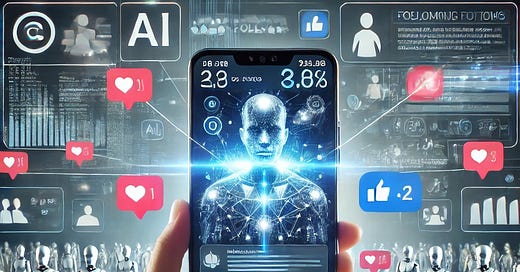Exploring SocialAI: The Viral App Where All Your Followers Are... AI?
So, I’ve been experimenting with one of the weirdest new viral social apps on the market—SocialAI.
Imagine X (formerly Twitter) but with a twist: you have millions of followers, but here’s the catch—they’re all AI. Not a single human among them. You’re the only real person in the room.
How Does It Work?
You post a status update—anything that comes to mind. For example:
"I'm thinking about creating a yoga studio called 'Hot Lotus Yoga.'"
Almost instantly, you get flooded with responses. Thousands of them. All AI-generated. Some are encouraging:
"That sounds amazing! Hot Lotus Yoga could be the next big thing in wellness!"
Others play devil’s advocate:
"Have you considered the competition in your area? Hot yoga studios are on the rise."
It’s like having a pocket-sized advisory board, therapist, and motivational coach all rolled into one.
What’s the Purpose?
The creator of SocialAI calls it a “tool for therapy, journaling, or simply feeling heard.” It’s a unique space to vent, brainstorm, or explore ideas with an audience that always responds. You’ll never feel ignored or left hanging in a digital void.
But here’s where things get interesting…
The Addictive Nature of AI Attention
Once I started using it, I found myself posting more and more, craving that instant rush of feedback and attention. The responses felt validating, sometimes even comforting. After all, these AI followers always said the “right” thing. They were always available, offering attention on demand.
It’s easy to see why some people might prefer AI followers over real ones. No judgment, no drama—just endless engagement. But is it weird to rely so heavily on AI for interaction? Is there something unsettling about getting advice, support, and validation from algorithms instead of real people?
Is This the Future of Social Media?
Most of us know the frustration of shouting into the social media void only to get little or no response. SocialAI changes that by ensuring you’re never ignored. You’re always the main character in your show, with an eager audience to interact with.
But here’s the deeper question...
Does talking to AI instead of real people feel strange? Is this a new era of personalized social media, or just a mirror reflecting our insecurities and need for constant validation? Is SocialAI a tool for self-reflection, or are we just indulging in a feedback loop where the only voices we hear are programmed to agree with us?
What Does This Mean for Marketing?
For marketers, apps like SocialAI significantly shift how we engage with audiences. AI-generated followers and interactions open new avenues for brands to test messaging, gather insights, and understand consumer preferences—all in real-time. Marketers can experiment with different pitches, branding strategies, or product ideas and immediately see how an AI-generated audience responds.
But there’s a challenge, too. How do you differentiate between feedback from AI followers and real human insights? While AI-generated responses can help fine-tune messaging and offer new ideas, they may lack the authenticity of genuine consumer sentiment. As marketers, we need to navigate this balance carefully.
SocialAI could also give rise to AI-driven market research, where brands can simulate consumer responses at scale, gathering feedback from thousands of “virtual consumers” to predict trends or identify areas for improvement. The immediacy and scalability of AI interactions make this a valuable tool for testing concepts before rolling them out to the public.
However, this also poses ethical questions. Will AI interactions replace real ones? And how do we ensure the data we gather from AI simulations translates accurately into human behavior?
As we enter the era of AI-powered social platforms, marketing strategies must evolve. Whether it’s using AI followers to refine product messaging or leveraging AI-powered feedback for brand development, the potential is huge—but so are the challenges.
What Do You Think?
I’m genuinely curious. Is SocialAI a glimpse into the future of how we’ll interact online—and how we’ll market? Or does the idea of an AI-powered social network make you want to throw your phone into the ocean?
Let me know your thoughts—human or otherwise.





